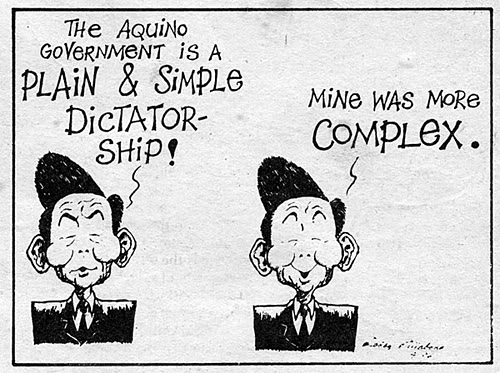Through this blog, I wish to share comments and my responses to them re the entry entitled “The political rehabilitation of the Marcoses”.
Mon Casiple believes that many of the 2010 voters are young and have no personal recollection of Marcosian martial rule. And that name recall is the ‘name’ (pun intended) of the senatorial game.
He infers therefore that many of these voters without knowledge of the past voted for Bongbong. This is a hypothesis that can be verified empirically. Niva Gonzales is of the same persuasion.
Pancho Lara wanted to know my take on why the Marcoses, particularly Bongbong, managed to get elected to a national post.
My answer:
Bongbong ran a skillful campaign by emphasizing the ‘good things’ (including the electricity-generating wind-mills) he had accomplished while governor in Ilocos Norte. Furthermore, no negative vote campaign was mounted against him. All fire was concentrated on GMA and the most likely sources of criticism–Satur Ocampo and Liza Masa–were quite compromised given that they were on the same ticket with Manny Villar as standard-bearer.
Both would have done the nation a great service by attacking GMA and Bongbong simultaneously.
Akbayan I believe can also be found lacking in this regard.
If the nation’s memory continues to be spotty, then FM II may just be a cruel reality. If that happens, then much of the blame may lie on us–those who went through the horrors of the dictatorship–but have not apparently done much to contest revisionist history.
For example, I did not see us joining the lonely campaign of that educator (whose name I cannot even recall at the moment) to correct many of the public school textbooks, many of which continue to extol the dictator.
I believe the singular insight that we could draw from the Marcoses’ rehabilitation is that our work, our struggle is far from over. It has in fact taken on a new dimension.
We should never blame the mass of ordinary voters for the mandates of the likes of Senators Bongbong, Bong Revilla and Lito Lapid. It simply means that we have not done enough.
But this means we will have to seriously address the issue: how will we–those who fought against the dictatorship–make ourselves a weightier actor in the Philippine political arena?
How can we build bridges to citizens–both organized and unorganized–who have no experience of martial law and have vague recollections of the same so they could join us in rejecting an unrepentant Marcos faction at the polls?
How should we deal with the opinion of many voters who believe that Marcosian rule was comparatively better given the shenanigans of post-Marcos ‘democratic’ governments?
We need to give democracy a ‘good’ name and convince one and all that it is superior to authoritarianism.
Our general task is to transform our current procedural democracy (some say it is an oligarchical democracy) into a substantial one that is more responsive to the needs of the greater majority and the under-classes.
Specifically, we should bring the struggle to the door-steps of the Marcoses. We should wage a tit-for-tat, or better yet, a n > 1-tit-for-one-tat, struggle against them. We should not leave any self-serving interview or press release unanswered.
Though difficult, we should bring the struggle to Ilocos and Leyte even as we continue to consider the big picture.
We should not neglect the international dimension of the contest. We could draw on the support of the various anti-Marcos dictatorship movements in different parts of the world.
The work is cut for us! Will we be up to it?
![Lake Dillon and a Tree [In Explore] Lake Dillon and a Tree [In Explore]](https://live.staticflickr.com/65535/53731226172_4004cbfea4_s.jpg)








